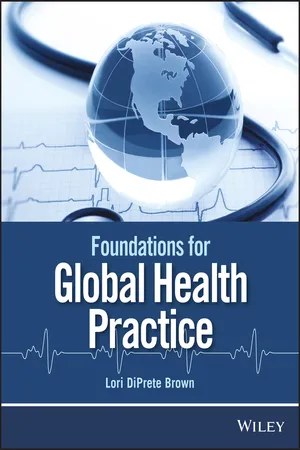
- English
- ePUB (mobile friendly)
- Available on iOS & Android
Foundations for Global Health Practice
About this book
Foundations for Global Health Practice offers a comprehensive introduction to global health with a focus on ethical engagement and participatory approaches. With a multi-sectoral perspective grounded in Sustainable Development Goals, the text prepares students for engagement in health care and public health and goes beyond traditional global health texts to include chapters on mental health, agriculture and nutrition, water and sanitation, and climate change. In addition to presenting core concepts, the book outlines principles for practice that enable students and faculty to plan and prepare for fieldwork in global health. The book also offers perspectives from global health practitioners from a range of disciplinary and geographic perspectives.
Exercises, readings, discussion guides and information about global health competencies and careers facilitate personal discernment and enable students to systematically develop their own professional goals and strategies for enriching, respectful, and ethical global health engagement.
- Understand the essential concepts, systems, and principles of global health
- Engage in up-to-date discussion of global health challenges and solutions
- Learn practical skills for engagement in health care and beyond
- Explore individual values and what it means to be an agent for change
Prevention, cooperation, equity, and social justice are the central themes of global health, a field that emphasizes the interdisciplinary, cross-sector, and cross-boundary nature of health care on a global scale. As the world becomes ever smaller and society becomes more and more interconnected, the broad view becomes as critical as the granular nature of practice. Foundations for Global Health Practice provides a complete and highly relevant introduction to this rich and rewarding field.
Tools to learn more effectively

Saving Books

Keyword Search

Annotating Text

Listen to it instead
Information
PART ONE
GLOBAL HEALTH CONCEPTS
CHAPTER 1
DEVELOPING A GLOBAL PERSPECTIVE
The teacher is no longer merely the-one-who-teaches, but one who is himself taught in dialogue with the students, who in turn while being taught also teach. They become jointly responsible for a process in which all grow.—Paulo Freire
LEARNING OBJECTIVES
- Understand your responsibility to continually acquire and share global health perspectives and information as a contributing member of your learning community
- Identify and articulate the unique perspectives and experiences that you want to share within your community, and prepare to listen and learn from the perspectives and experiences of others
- Describe and access a variety of global health information sources that can inform global health work and study
- Consider literature and the arts as ways to inform and better understand health and well-being
- Create a personalized plan to use information sources, the arts, networks, and engagement to stay informed about global health
Sharing Perspectives in a Diverse Learning Community
Table of contents
- Cover
- Title Page
- Copyright
- Dedication
- Preface
- About the Author
- Contributors
- Acknowledgments
- Introduction
- Part One Global Health Concepts
- Part Two Global Health Practice
- Part Three Global Health Perspectives
- Glossary
- Index
- EULA
Frequently asked questions
- Essential is ideal for learners and professionals who enjoy exploring a wide range of subjects. Access the Essential Library with 800,000+ trusted titles and best-sellers across business, personal growth, and the humanities. Includes unlimited reading time and Standard Read Aloud voice.
- Complete: Perfect for advanced learners and researchers needing full, unrestricted access. Unlock 1.4M+ books across hundreds of subjects, including academic and specialized titles. The Complete Plan also includes advanced features like Premium Read Aloud and Research Assistant.
Please note we cannot support devices running on iOS 13 and Android 7 or earlier. Learn more about using the app